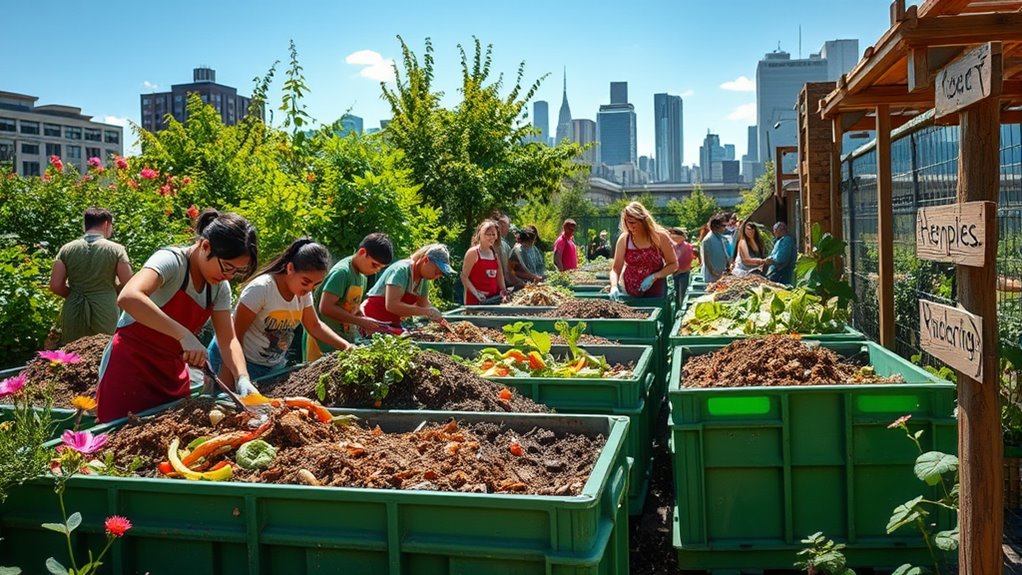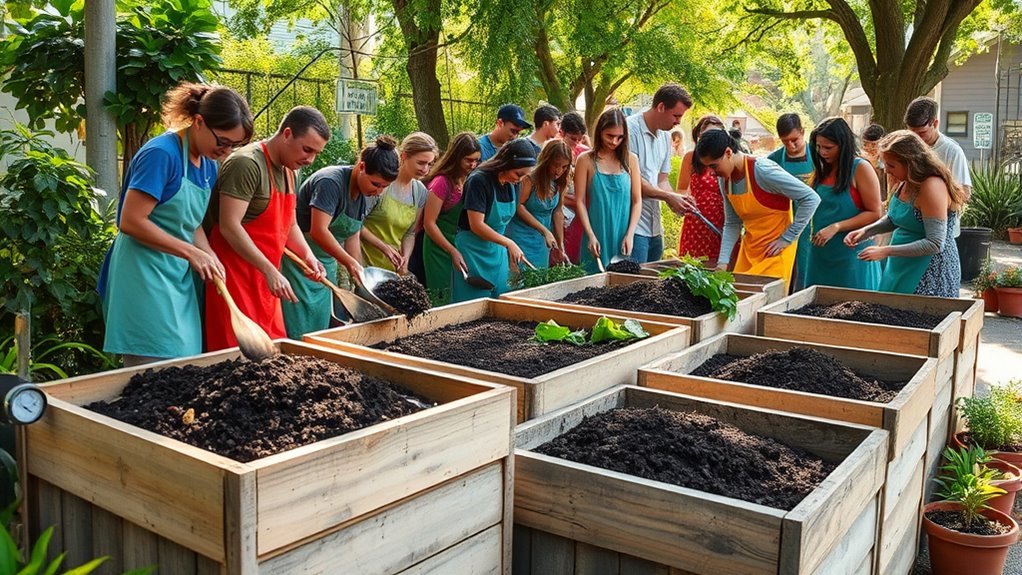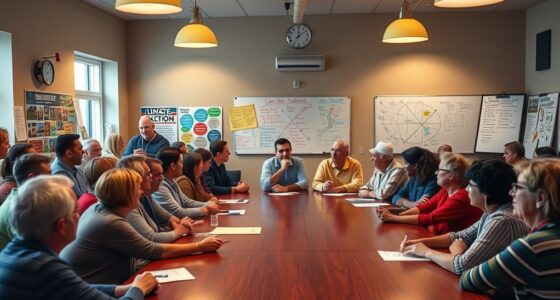Community composting programs help you turn your city’s organic waste into valuable soil that benefits local gardens and parks. You can participate by collecting food scraps like vegetable peels, coffee grounds, and eggshells, then adding them to designated compost bins. This process reduces landfill waste, cuts methane emissions, and promotes urban sustainability. Getting involved strengthens community bonds and supports eco-friendly practices. If you want to discover how these initiatives work and make a difference, there’s more to explore below.
Key Takeaways
- Community composting transforms organic waste into valuable soil amendments, reducing landfill contributions and promoting urban sustainability.
- Residents participate by collecting food scraps and bringing them to designated compost sites, fostering shared responsibility.
- Proper composting practices enhance microbial activity, ensuring high-quality compost for community gardens and urban agriculture.
- Educational programs and workshops increase awareness of waste reduction and sustainable waste management strategies.
- Community composting supports local food growth, reduces transportation emissions, and encourages a circular economy in cities.

Community composting programs offer an effective way for neighborhoods to reduce waste and promote sustainability. When you participate, you’re directly contributing to food waste reduction, which is vital for tackling the mounting waste problem in urban areas. Instead of tossing scraps into the trash, you turn your organic waste into valuable compost, transforming what would be landfill material into a resource that benefits your community. This process not only minimizes the amount of waste sent to landfills but also helps reduce methane emissions, a potent greenhouse gas associated with decomposing food waste. As a result, community composting becomes a key strategy for advancing urban sustainability, making your neighborhood more resilient and environmentally friendly.
Getting involved in community composting is straightforward and empowering. You start by collecting food scraps like vegetable peels, coffee grounds, eggshells, and fruit scraps—things you might normally throw away. Instead of contaminating your trash or recycling bins, you bring these materials to a designated composting site or participate in a shared compost bin managed by your neighborhood. This collective effort guarantees that organic waste is properly processed, avoiding contamination and maximizing the quality of the compost produced. Proper waste management ensures that composting remains an effective and sustainable practice, reducing environmental impact. Engaging in community participation also helps foster a sense of shared responsibility and pride in local environmental initiatives. Additionally, understanding biological processes involved in composting can help optimize the quality and efficiency of compost production. Learning about microbial activity can further enhance the decomposition process and the quality of the final product. By doing so, you actively participate in closing the loop of local food systems, turning waste into a valuable resource that can be used to enrich community gardens, parks, or local farms. Incorporating high-quality compost from community programs can significantly improve soil health and plant growth.
Participating in community composting also fosters a sense of shared responsibility and community engagement. As you work alongside neighbors, you develop a deeper understanding of sustainable practices and the importance of reducing your ecological footprint. It encourages conversations about urban sustainability and promotes a culture of environmental stewardship. Additionally, the compost generated can be used to grow food locally, further decreasing the environmental impact of transporting produce from distant farms. This cycle of growth and reuse exemplifies the principles of sustainable urban living, where every individual’s actions contribute to a healthier, more resilient city.
In addition, community composting programs often include educational components, workshops, and outreach efforts that help you learn more about sustainable waste management. These initiatives empower you with knowledge and practical skills to reduce food waste at home and advocate for broader waste reduction policies. Whether you’re a seasoned environmentalist or just beginning to explore sustainable living, participating in community composting gives you tangible ways to make a difference. It’s a simple, impactful step toward creating a greener, more sustainable city where waste is seen as a resource, not a problem. By engaging with these programs, you help build a more circular economy that benefits everyone, now and in the future.
Frequently Asked Questions
How Do Community Composting Programs Impact Local Wildlife?
Community composting programs impact local wildlife by promoting urban biodiversity and habitat preservation. When you participate, you reduce waste in landfills, which helps maintain healthier soil and ecosystems. Composting creates habitats for beneficial insects and small animals, supporting diverse species. By managing organic waste responsibly, you help preserve natural habitats within your city, encouraging a balanced environment where wildlife can thrive alongside urban development.
What Are the Costs Associated With Starting a Community Composting Program?
Starting a community composting program costs roughly $2,000 to $10,000, depending on its size and scope. A thorough cost analysis helps identify expenses like equipment, site setup, and maintenance. Funding sources vary, including grants, local government support, and community donations. You need to plan carefully to make sure your program is sustainable and effective, balancing initial investment with ongoing operational costs.
How Do Programs Ensure Compost Quality and Safety?
You guarantee compost quality and safety by regularly conducting soil testing to monitor nutrient levels and detect any contamination. Implement contamination prevention measures, like proper waste sorting and avoiding hazardous materials, to keep the compost safe for use. Educate participants on best practices, and monitor the process consistently to maintain high standards, ensuring the final compost is both nutrient-rich and free from harmful substances.
Can Community Composting Reduce Overall City Waste Disposal Fees?
You might wonder if community composting can cut city waste disposal fees, and the answer is yes. By reducing the amount of waste sent to landfills, these programs lower disposal costs, providing clear economic benefits. They also influence policy implications by encouraging sustainable practices. As participation grows, cities can save money and promote environmental responsibility, making community composting an effective strategy for managing waste more efficiently.
What Are the Best Practices for Engaging Reluctant Community Members?
Did you know that 60% of residents are more likely to participate in recycling when engaged through community outreach? To involve reluctant community members, focus on personalized outreach and clear communication. Use incentives programs like discounts or recognition to motivate participation. Building trust and highlighting the environmental benefits can also foster engagement. By making involvement accessible and rewarding, you’ll turn skeptics into active contributors in your community’s composting efforts.
Conclusion
By participating in community composting, you might just prove the theory that small actions can create big change. Turning food scraps into compost reduces waste and enriches local soil, showing how collective effort transforms city waste into valuable resources. If enough of us get involved, we could challenge the idea that urban waste is inevitable and demonstrate that sustainable cities are within reach. So, why not start composting today and be part of the solution?










